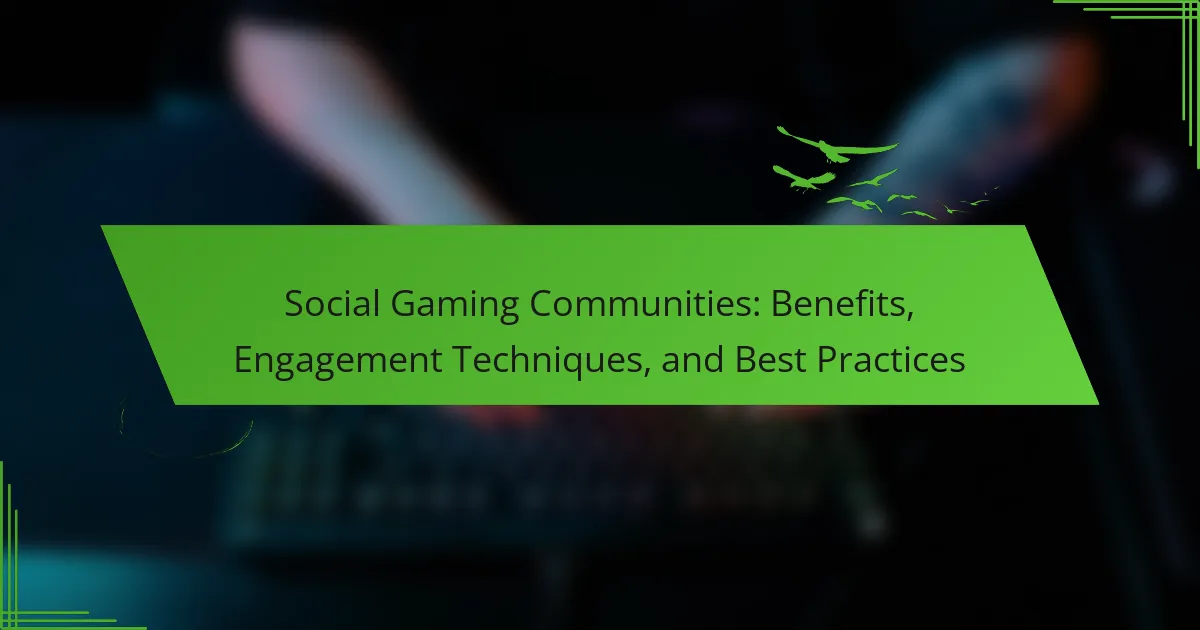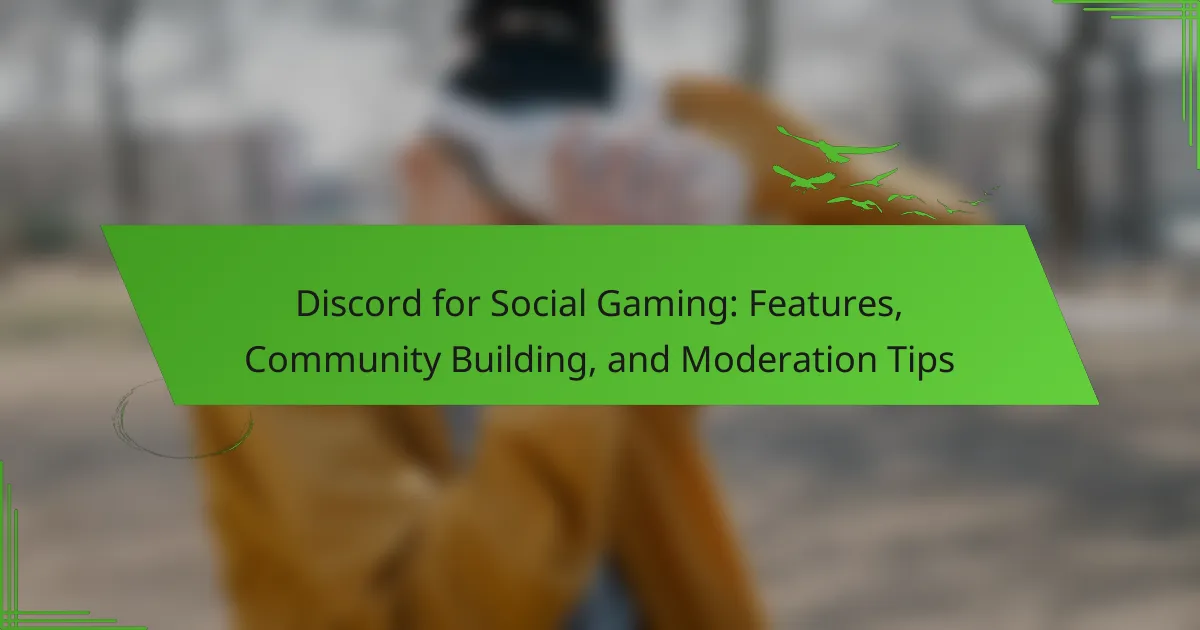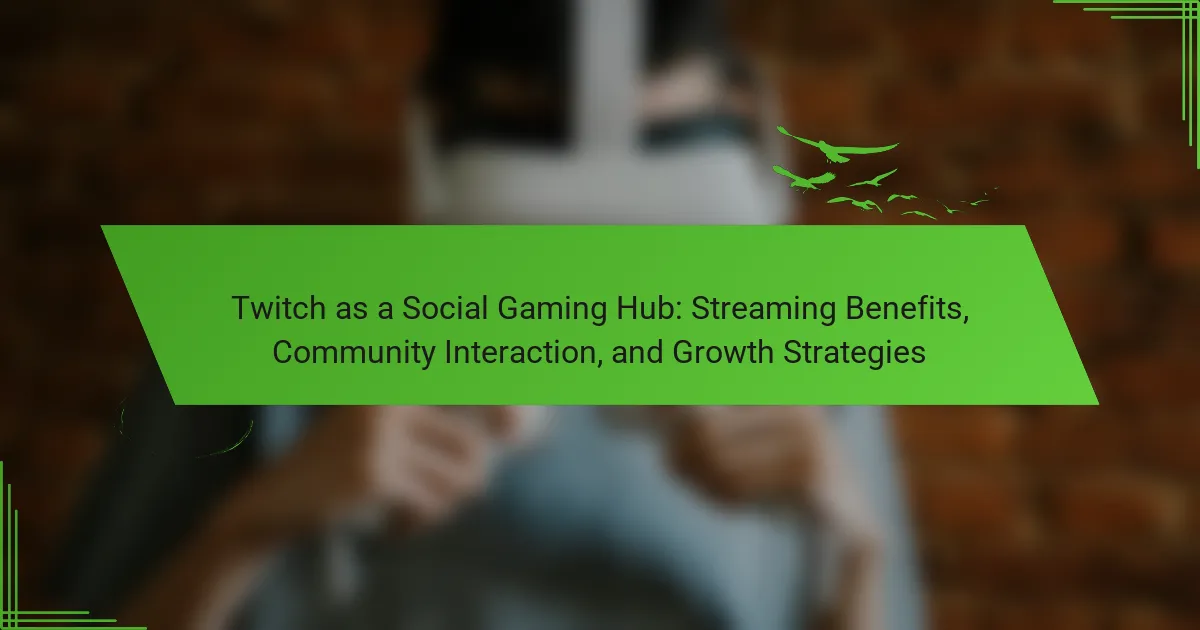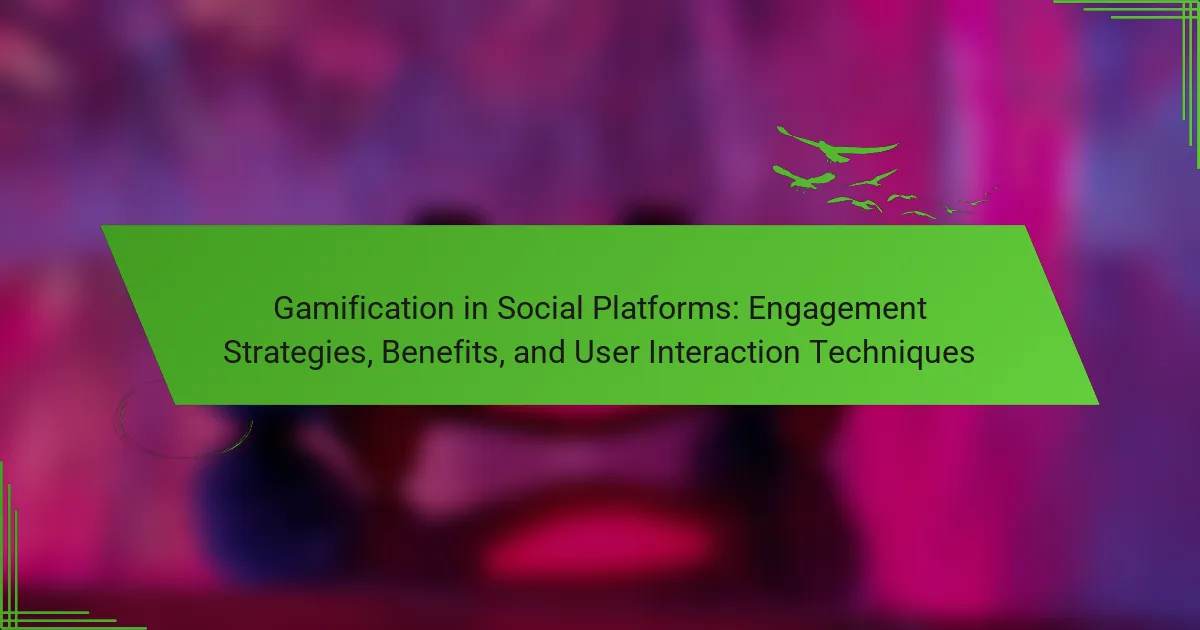Social gaming communities enhance player experiences through social interaction and support. This article explores the benefits of these communities, effective engagement techniques, and best practices for management. Focus will be on fostering communication, creating inclusive environments, and utilizing rewards systems to boost participation. Additionally, we will address challenges faced by these communities as they evolve.
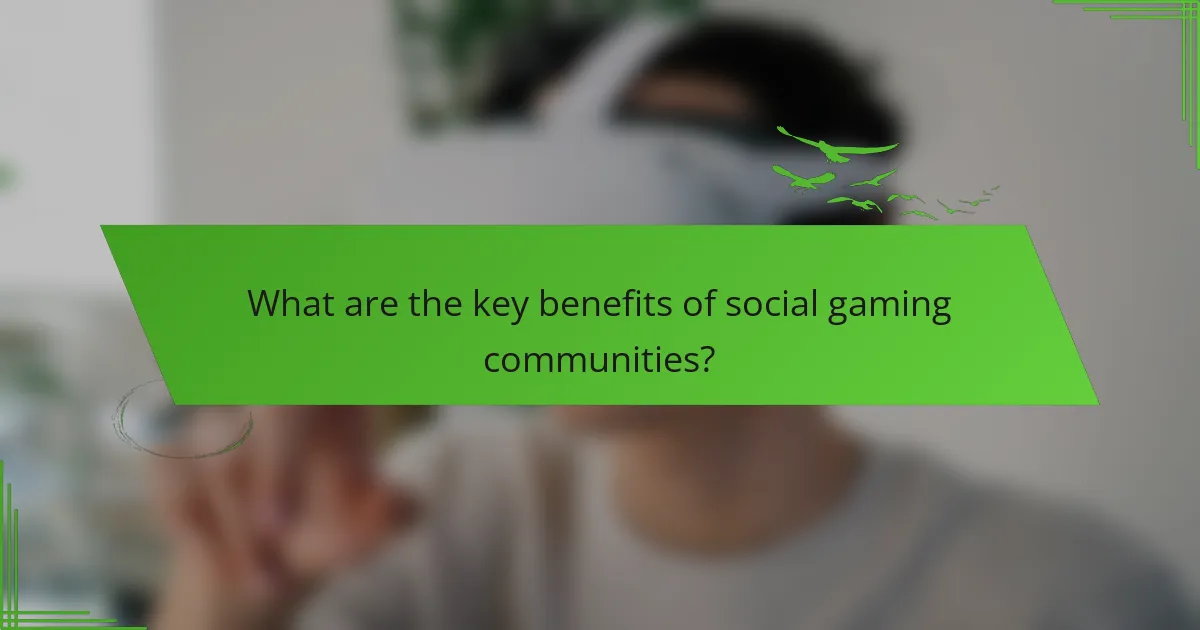
What are the key benefits of social gaming communities?
Social gaming communities offer numerous benefits that enhance player experience and engagement. They foster social interaction, which can lead to lasting friendships and a sense of belonging. Additionally, these communities provide support through shared knowledge and strategies, improving gameplay. Engaging in social gaming can also boost mental well-being by reducing stress and promoting teamwork. Furthermore, regular participation in these communities encourages consistent gaming habits, which can enhance skills over time.
How do social gaming communities enhance player engagement?
Social gaming communities significantly enhance player engagement through shared experiences and social interactions. These communities foster connections among players, leading to increased loyalty and motivation. Techniques such as collaborative gameplay, in-game events, and community challenges create a sense of belonging. Best practices include actively moderating discussions, encouraging user-generated content, and recognizing player achievements, which further strengthen community ties.
Which social dynamics foster community building in gaming?
Social dynamics that foster community building in gaming include collaboration, communication, and shared experiences. These elements create a sense of belonging and engagement among players. Collaborative gameplay encourages teamwork, enhancing social bonds. Effective communication, through voice chat or forums, allows players to connect and share strategies. Shared experiences, such as participating in events or challenges, strengthen community ties and foster loyalty.
Why are social gaming communities important for mental well-being?
Social gaming communities significantly enhance mental well-being by fostering social connections and providing emotional support. These communities reduce feelings of loneliness and isolation, promoting a sense of belonging among members. Engaging in cooperative gameplay encourages teamwork and communication, which can improve interpersonal skills. Furthermore, social gaming can serve as a healthy outlet for stress relief, allowing individuals to escape daily pressures and enjoy immersive experiences. Ultimately, these communities contribute positively to mental health by creating supportive environments that encourage interaction and collaboration.
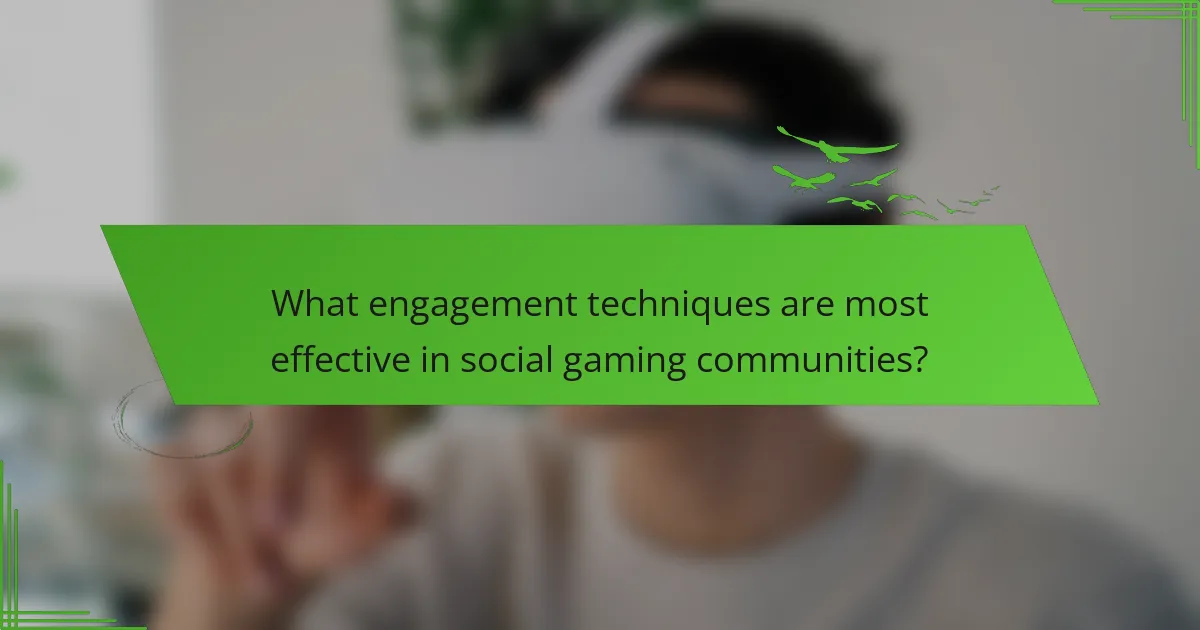
What engagement techniques are most effective in social gaming communities?
Effective engagement techniques in social gaming communities include fostering communication, creating inclusive environments, and utilizing rewards systems. These methods enhance player interaction and satisfaction. Incorporating user-generated content can also deepen community ties and encourage active participation.
How can game developers create inclusive environments?
Game developers can create inclusive environments by prioritizing accessibility, fostering diverse communities, and implementing inclusive design practices. Accessibility features, such as customizable controls and visual aids, ensure that all players can engage. Encouraging diverse representation in character design and storytelling enhances relatability. Developers should also promote community guidelines that discourage toxicity and support positive interactions among players.
What role do events and tournaments play in community engagement?
Events and tournaments significantly enhance community engagement by fostering social interaction and competition. They create opportunities for players to connect, share experiences, and build relationships. These gatherings can boost motivation, as participants strive to improve their skills and achieve recognition. Additionally, they often generate excitement and a sense of belonging, reinforcing the community’s identity. Engaging in events can lead to increased retention rates and a vibrant, active community atmosphere.
Which communication tools are most popular among gaming communities?
Discord, Twitch, and Reddit are the most popular communication tools among gaming communities. These platforms foster engagement through real-time chat, streaming, and discussion forums. Discord offers voice and text channels tailored for different games, enhancing collaboration. Twitch allows gamers to livestream gameplay, creating interactive experiences. Reddit hosts diverse communities where players share tips and news, enriching the gaming culture.
How does user-generated content contribute to community interaction?
User-generated content significantly enhances community interaction by fostering engagement and collaboration among members. It encourages players to share experiences, strategies, and achievements, creating a sense of belonging. This content often includes game reviews, fan art, and tutorials, which enrich the community’s knowledge base. As a result, user-generated content not only strengthens relationships but also drives participation and loyalty within social gaming communities.
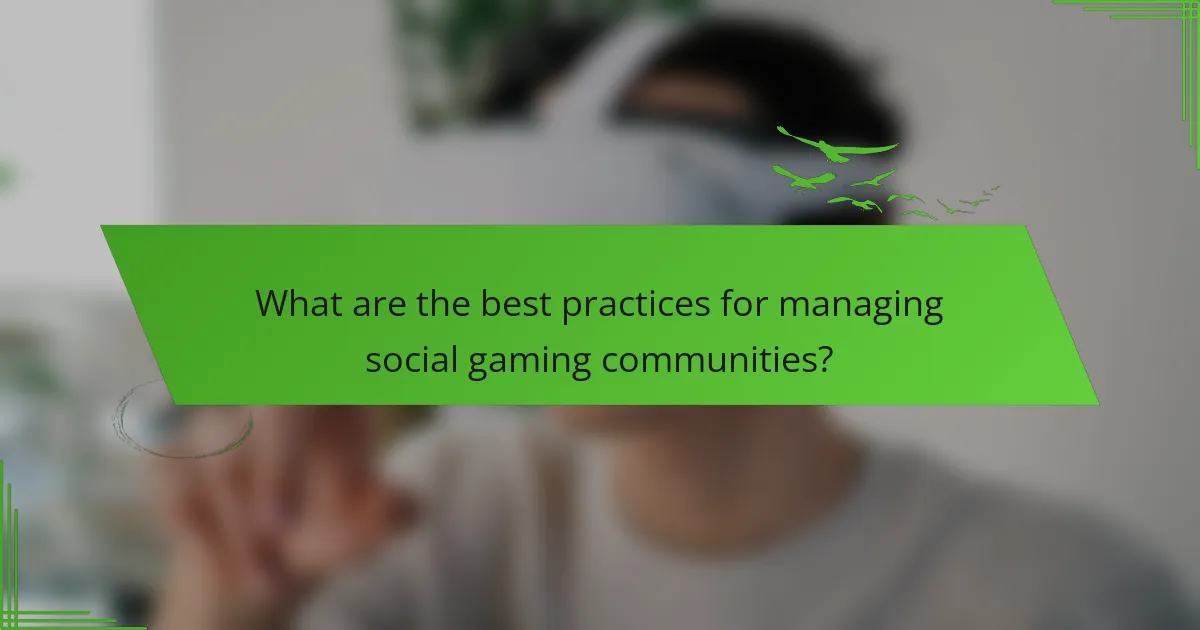
What are the best practices for managing social gaming communities?
To effectively manage social gaming communities, prioritize active engagement, clear communication, and positive interactions. Establish guidelines that promote inclusivity and respect among members. Regularly host events and activities to maintain interest and foster connections. Encourage user-generated content to enhance community involvement and ownership. Monitor discussions to ensure a safe environment while providing support for any issues that arise.
How can moderators effectively handle conflicts within communities?
Moderators can effectively handle conflicts within communities by fostering open communication and establishing clear guidelines. They should actively listen to all parties involved and facilitate discussions to find common ground. Encouraging empathy and understanding among members can lead to resolution. Additionally, implementing conflict resolution training for moderators enhances their skills in managing disputes.
What strategies can be employed to maintain a positive community culture?
To maintain a positive community culture in social gaming, implement clear communication, foster inclusivity, and encourage collaboration. Establish guidelines that promote respect and support among members. Regularly engage the community through events and feedback sessions to strengthen bonds. Recognize and celebrate contributions to enhance motivation and belonging.
How do analytics inform community management decisions?
Analytics guide community management decisions by providing data-driven insights into member behavior and engagement patterns. This information helps identify popular game features, optimal communication times, and effective content strategies. By analyzing metrics such as user retention and participation rates, community managers can tailor their approaches to enhance member satisfaction and foster a vibrant social gaming environment. For instance, tracking engagement levels during specific events can inform future planning, ensuring that community activities align with member interests.
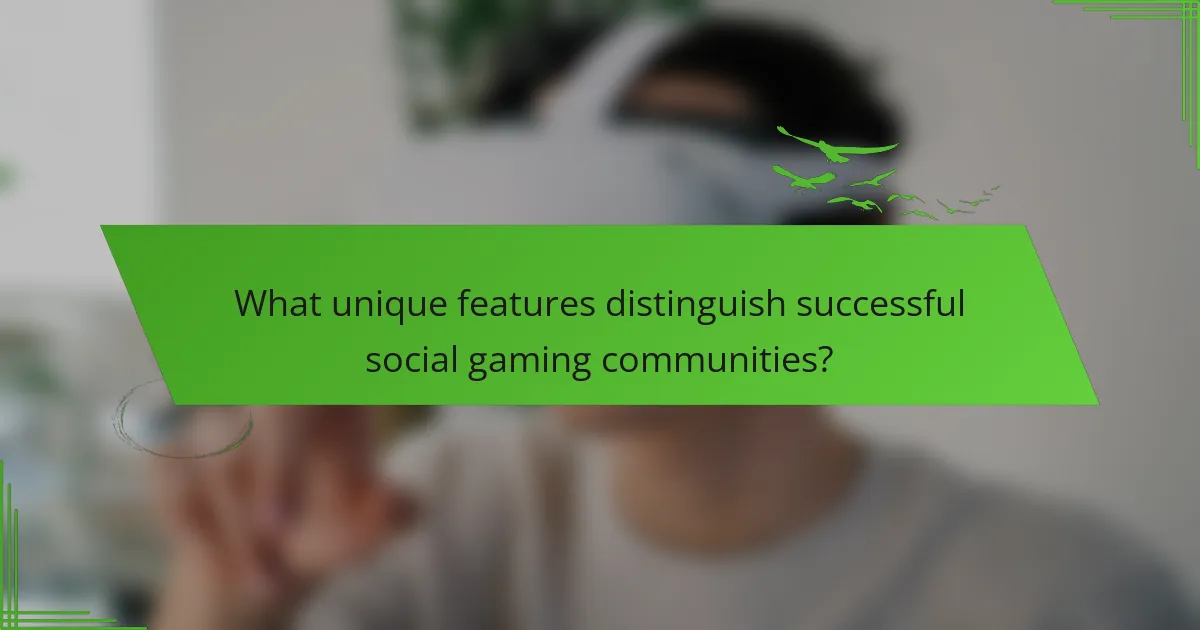
What unique features distinguish successful social gaming communities?
Successful social gaming communities are distinguished by strong engagement, supportive environments, and effective communication. These features foster loyalty and enhance player experiences.
Engagement techniques include regular events and challenges that promote interaction. Supportive environments encourage players to share experiences and provide assistance. Effective communication, such as clear feedback channels, strengthens community bonds.
Unique attributes like user-generated content and personalized experiences also set successful communities apart. These elements create a sense of ownership and investment among players.
In summary, successful social gaming communities thrive on engagement, support, and communication, combined with unique features that enhance player connection.
How do cultural influences shape community interactions in gaming?
Cultural influences significantly shape community interactions in gaming by fostering diverse social dynamics. These influences create unique engagement techniques that enhance collaboration and competition among players. For example, cultural norms dictate communication styles, teamwork approaches, and conflict resolution methods, leading to varied community experiences. Additionally, shared cultural backgrounds can enhance bonding, creating stronger ties within gaming communities. Understanding these dynamics can improve best practices for community management and player engagement, ultimately leading to more inclusive and vibrant gaming environments.
What innovative platforms are emerging for social gaming experiences?
Innovative platforms for social gaming experiences include immersive virtual reality spaces, community-driven game design tools, and cross-platform multiplayer environments. These platforms enhance user engagement through interactive features and social connectivity. For example, platforms like Roblox and Discord enable user-generated content and real-time communication, fostering vibrant gaming communities. Additionally, blockchain technology is emerging, allowing players to own in-game assets, which creates new economic opportunities within social gaming.
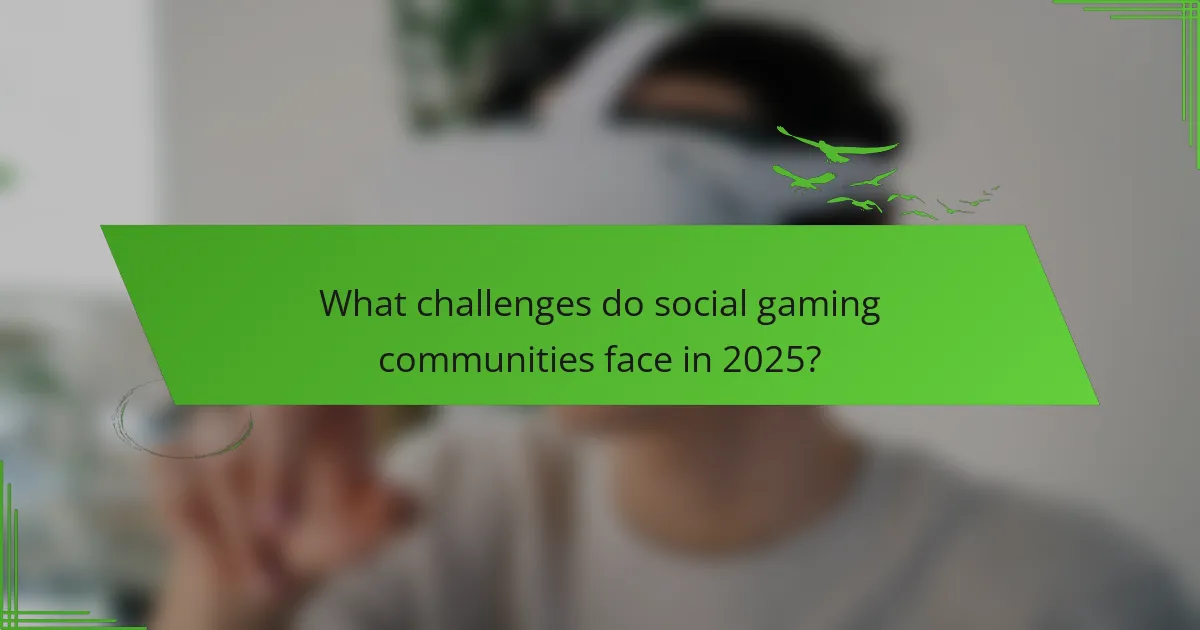
What challenges do social gaming communities face in 2025?
Social gaming communities will face challenges in 2025, including toxicity, platform fragmentation, and evolving user expectations. Toxic behavior can lead to decreased engagement and community fragmentation. As platforms diversify, players may find it harder to connect across different games. Additionally, user expectations for inclusivity and innovative features will continue to rise, necessitating adaptive strategies from community managers.
How do privacy concerns impact community participation?
Privacy concerns significantly hinder community participation in social gaming. When users fear their personal data may be compromised, they often withdraw from engagement. This reluctance can limit the sharing of experiences, which is vital for community growth. Additionally, strict privacy regulations may restrict developers from implementing features that enhance interaction. As a result, communities may struggle to maintain active participation and user trust.
What are the implications of toxicity in gaming communities?
Toxicity in gaming communities can lead to decreased engagement and a negative atmosphere. This undermines the social benefits of gaming, such as teamwork and camaraderie. Toxic behaviors can deter new players, causing community fragmentation. Effective moderation and positive reinforcement strategies are essential to mitigate these effects.
Which trends are shaping the future of social gaming communities?
Emerging trends shaping social gaming communities include enhanced interactivity, cross-platform play, and community-driven content. These elements foster deeper engagement and collaboration among players.
1. Enhanced Interactivity: Gamers increasingly seek immersive experiences with real-time interactions, driving developers to incorporate advanced features like voice chat and live streaming.
2. Cross-Platform Play: The ability to play across different devices promotes inclusivity and expands community reach, allowing players to connect regardless of their gaming platform.
3. Community-Driven Content: User-generated content is gaining traction, enabling players to create and share their own game modifications and experiences, which strengthens community bonds.
4. Focus on Mental Health: Many gaming communities are prioritizing mental well-being, providing support networks and resources to promote a positive gaming environment.
5. Gamification of Social Interaction: Integrating game mechanics into social platforms encourages participation and rewards engagement, enhancing user experience and community loyalty.
What practical tips can enhance your experience in social gaming communities?
Participating actively in social gaming communities enhances your experience significantly. Engage regularly through discussions, share your gameplay, and provide constructive feedback to others.
Build relationships by collaborating on projects or events, which fosters a sense of belonging. Utilize community tools, like forums and chat platforms, to stay informed about updates and activities.
Be respectful and inclusive, as this encourages a positive environment. Lastly, participate in community events to strengthen connections and enhance your overall gaming experience.
